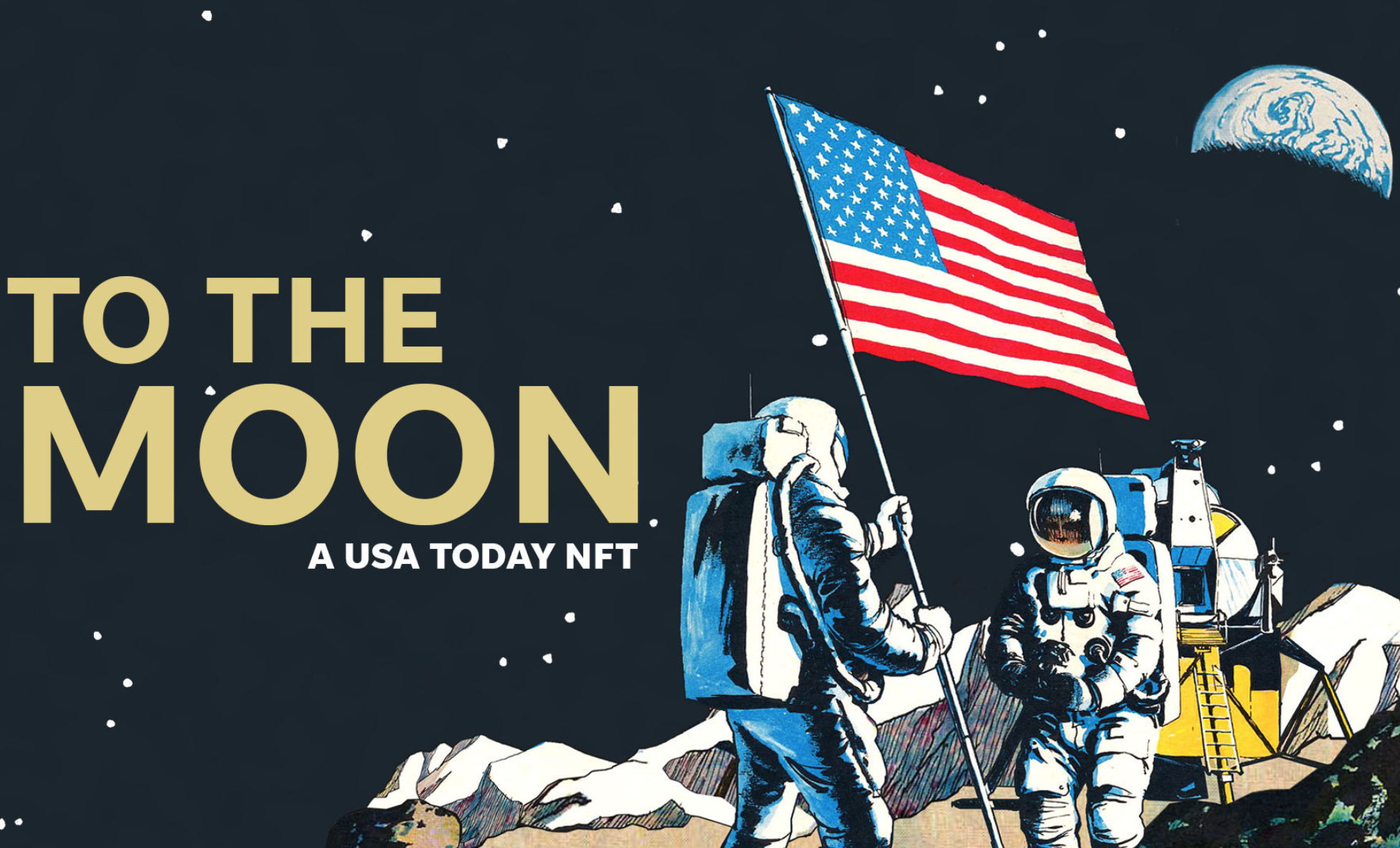
Local news giant Gannett believes there could be a “large opportunity” for publishers in the growing market of non-fungible tokens (NFTs).
Gannett, which owns USA Today and hundreds of local news titles across the US and UK, recently sold its first NFT for more than $8,000.
The proceeds of that auction went to charity. But, taking inspiration from Major League Baseball (MLB), the company is hopeful that NFTs could turn into a viable revenue stream as the sector grows.
Click here to subscribe to Press Gazette’s must-read newsletters, Future of Media and Future of Media US |
What is an NFT and how are publishers experimenting with them?
NFTs are certificates that verify ownership of digital items.
Still a young market, the most high-profile sale to date saw Christie’s sell the NFT of a piece of digital art for $69m.
The piece, a collage by Mike Winkelmann – professionally known as Beeple – called ‘Everydays: The First 5000 Days’, can be viewed online for free, so bidders are essentially paying for the prestige of ownership. They can also choose to sell on their NFTs and potentially make a profit on their investment.
NFTs have also been embraced by MLB, which has been auctioning off digital collectibles, including virtual baseball cards.
Media companies including Gannett, the New York Times and Quartz have started experimenting with NFTs in recent months.
In March, over a four-day auction, Quartz claimed a world first by selling an NFT news article for 1 Ethereum (a cryptocurrency), or around $1,800 at the time. The New York Times then sold a column for 350 Ether (another cryptocurrency), or around $560,000.
Gannett’s first auction
Gannett launched its inaugural NFT on 22 June.
To mark the 50th anniversary of Florida Today being delivered into space, it auctioned off an interactive mosaic containing more than 300 images from 50 years of space coverage.
Powered by Origin’s NFT Launchpad, the ‘First Newspaper Delivered to the Moon’ collection sold for $8,165.
Quartz, the New York Times and Gannett all donated the proceeds of their first auctions to charity.
But Gannett believes NFTs could present a serious new line of revenue in the future.
Presenting Gannett’s first quarter results in May, chief executive Mike Reed told investors: “We are excited about the NFT market because we believe it creates several new opportunities for Gannett.”
He said it may create a “new way for consumers to enjoy and experience Gannett’s award-winning coverage of historical events, monumental moments and areas of passion or special interests”.
Reed added that NFTs could represent “a new business opportunity for Gannett as we see how this space continues to develop and how our incredible archives could be monetised in new marketplaces”.
Q&A with Kris Barton
To find out more, Press Gazette conducted an email Q&A with Kris Barton, Gannett’s chief product officer, after its first NFT auction.
He explained how Gannett is looking to MLB for NFT inspiration, and why he thinks there could be a “large opportunity” for local news publishers in this growing space.
Q: Following Gannett’s first NFT auction, is the company encouraged and confident that this could be an area of commercial growth in the future?
 “Conducting our first NFT required a truly cross-departmental team from product, editorial, legal, finance, the Gannett Foundation and marketing (among others) to come together. It was a great collaborative effort to brainstorm and create something relevant and unique. The space race is topical but also historical, and our NFT really brought our content to life.
“Conducting our first NFT required a truly cross-departmental team from product, editorial, legal, finance, the Gannett Foundation and marketing (among others) to come together. It was a great collaborative effort to brainstorm and create something relevant and unique. The space race is topical but also historical, and our NFT really brought our content to life.
“This inaugural NFT enabled us to learn quite a bit about the developing space and raise funds for two great organisations. Gannett has been focused on technology and we’ve invested in digital experiences and emerging technologies (check out our latest AR that highlights the Tokyo Games here).
“Given our history, legacy and exploring our massive media achievements, creating this NFT was a natural next step for the organisation. This was an experiment in innovation for Gannett which we consider an accomplishment.”
Q: Is Gannett working on any specific NFT-related plans currently? Or are they in the idea phase?
“Our team is always exploring what’s next and how best to use blockchain and crypto technologies to bring our historical and award-winning content to consumers.
“We are focused on both our current customers and new customer segments, looking for different ways to be part of current news events, popular culture and memorable moments.
“We’ll continue to learn through our research, listening to our loyal customers, having conversations within the industry and beyond, and learning from what has been successful for others.
“Given the vast content we’ve produced across the country throughout our 100+ year history, there’s a tremendous amount of content for us to use as we ideate and explore how best to execute and bring them to life as unique and compelling digital offerings.”
Q: Would future NFT collections like the ‘First Newspaper Delivered to the Moon’ collection be based around coverage of major news events, or are there other formats that could be explored?
“We have explored coverage around monumental events and are considering other formats. Like other publishers that have created NFTs, we want to ensure our assets resonate with those who are investing in this new type of content while reaching a new audience.
“Our content, emerging technology and product teams have been collaborating and bringing engaging experiences to our diverse audiences by exploring virtual reality, augmented reality and different elements of user experience within our mobile and web experience to help consumers feel like they are part of the story.
“Our focus with ‘First Newspaper Delivered to the Moon’ was to tell the story of innovation and advancement that has been a positive, unifying force in American culture – which is also the aim of Gannett’s storytelling regardless of the format.”
Q: How big of a business do you think NFTs could be for Gannett and for other newspaper businesses in the future?
“We think there’s a large opportunity, but it may manifest itself in different ways.
“We will continue to monitor the space as it continues to develop, but NFTs are a part of a more significant opportunity to engage new audiences in new ways.
“We see opportunities with NFTs as daily low price points with high volume – encapsulating single moments that may attract large or niche audiences, and as a draw for subscriptions using creative bundles.”
Q: What were the challenges of running this first auction and how could these be overcome in the future?
“We didn’t really consider this initiative a challenge, rather an opportunity to learn. Working with our partners at Origin Protocol, we were educated on the technical aspects of supporting the digital assets as part of the NFT collection in their marketplace.
“We delivered a genuinely innovative asset and provided a unique mosaic of space coverage. The result was 300 images from over 50 years of coverage that was out of this world (pun intended)!
“In the future, we may look at whether there are opportunities to simplify what we create depending on the audience or innovate even further.”
Q: As you experiment with NFTs, which companies and NFT auctions are you looking to as inspiration for success?
“There’s a ton of innovation and creativity in the space. We are most inspired by the companies building communities around their NFTs and remain true to who the company or organisation is.
“For instance, MLB launched an NFT collection dedicated to the great Lou Gehrig, highlighting the natural evolution to the nostalgic past time of trading and collecting baseball cards.
“This mirrors the mission of our organisation and we will be watching their progress as we cheer their success.”
Email pged@pressgazette.co.uk to point out mistakes, provide story tips or send in a letter for publication on our "Letters Page" blog
